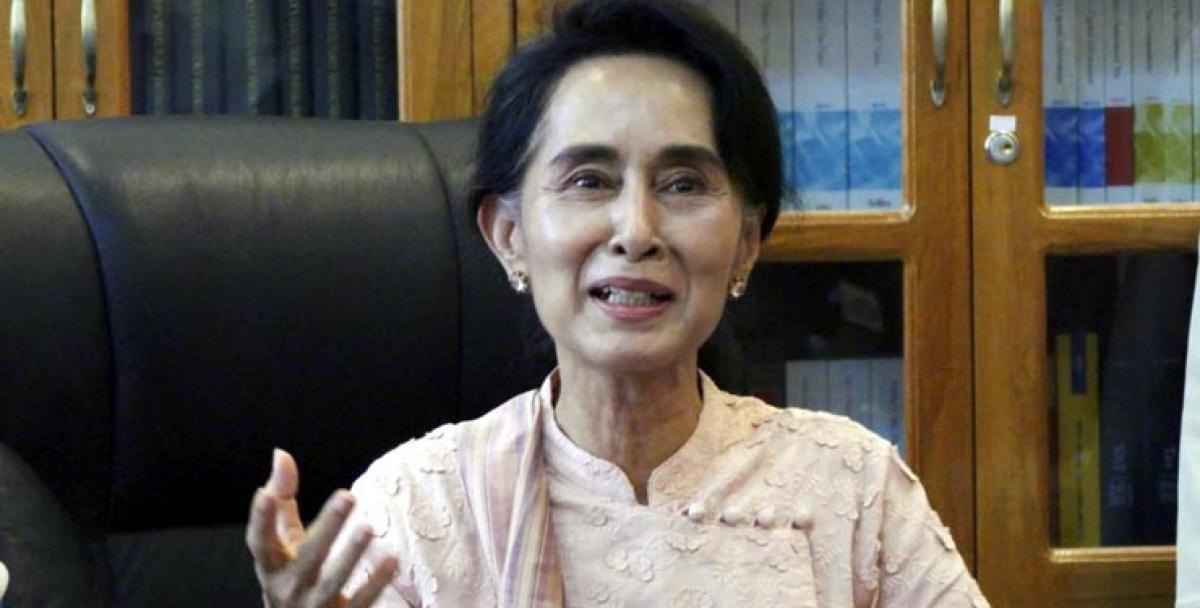Live
- Malaria cases, deaths in India decline by 69pc between 2017-2023: WHO
- ED raids three places in Bengal in online forgery scam case
- Manchu Manoj Questioned by Police Amid Family Dispute
- Bengaluru: IMD Issues Yellow Alert Amid Upcoming Rainfall
- Manchu Vishnu Addresses Media, Clarifies Incident Involving Mohan Babu
- HPCL inks pact with Sea6 Energy to convert seaweed biomass into fuels
- Numaish 2025: Hyderabad’s Grand Exhibition Kicks Off in January – All You Need to Know
- There will be opportunities from every crisis, says CM Chandrababu at collectors' conference
- Women now own 20.5 pc of MSMEs in India, startups surge in tier 2 and 3 cities
- 9 in 10 Indian firms say cloud transformation fuelling AI adoption: Report
Just In

x
Highlights
General elections in Myanmar are scheduled to be held on November 8 this year, and the popularity of the country\'s most charismatic leader, Aung San Suu Kyi, is surging.
Bangkok: General elections in Myanmar are scheduled to be held on November 8 this year, and the popularity of the country's most charismatic leader, Aung San Suu Kyi, is surging.
The election is being touted as the most participative polls in the history of Myanmar, and Suu Kyi, the head of Myanmar's largest political formation, the National League for Democracy (NLD), will be participating in a full-fledged election for the first time since 1990.
 Though the military junta-backed Union Solidarity and Development Party (USDP) enjoys an inherent advantage in any electoral contest in Myanmar largely due to a manipulation of electoral laws and constitutional provisions, reserving 25 percent of seats in the upper and lower houses for the military, the challenge from a resurgent NLD is being perceived as being serious.
Though the military junta-backed Union Solidarity and Development Party (USDP) enjoys an inherent advantage in any electoral contest in Myanmar largely due to a manipulation of electoral laws and constitutional provisions, reserving 25 percent of seats in the upper and lower houses for the military, the challenge from a resurgent NLD is being perceived as being serious.The general response to NLD during the election campaign indicates that Suu Kyi's strategy of putting the party and her own personality at the forefront of election campaign could yet be the political master stroke.
According to informed sources and reports, the regional areas of Myanmar are ostensibly dominated by various ethnic groups, but Suu Kyi has received an enthusiastic response during her campaigns across the country.
The ruling USDP's efforts to make inroads into ethnic areas through the Nationwide Ceasefire Agreement (NCA) has not had the desired outcome.
On the other hand, the NLD has the advantage of the presence of regional political formations aligned or associated with it.
The only area where the NLD may face a serious challenge among the ethnic regions is the Chin State, where the Chin National Front (CNF) has signed the NCA and its political fronts may get the full backing of the government machinery.
The military junta has tried to balance the NLD's popular support base across the country through regional ethnic formations, mainly by engaging them in negotiations for the NCA. However, the government has not achieved the desired objective and has had to compromise. Only eight ethnic groups have signed the NCA, while major formations like the Kachins, Was and Nagas have opted to keep out.
In a bold and confident election gambit, Suu Kyi has appealed to the voters to vote for the NLD as a party and not for any individual candidate. In fact, she has denied nominations to several prominent personalities, causing some initial confusion and surprise.
In a recent interview to senior Indian media personality, Karan Thapar, Suu Kyi was quite forthcoming about her resolve to lead the next government, notwithstanding constitutional and regulatory obstacles.
Over the years, she has positioned herself as a consummate and deft politician who is more than willing to use the tools of dialogue and negotiations to bring in the much needed political and government reforms in Myanmar without generating major friction or conflict in the polity or the society.
On the other hand, the ruling establishment is showing signs of fissures as evident by the "palace coup" and the purge of former General and present speaker Thura Shwe Man.
The latter may have drawn the wrath of hardliners for showing an inclination to work with Suu Kyi. However, the army backed dominant group within the USDP has not been able to completely obliterate the sections willing to work with other rival political formations and groups, and thus, the possibility of a split in the USDP after the elections cannot be ruled out especially if the NLD performs well enough to emerge as a legitimate contender for power post the elections.
It comes as no surprise that Suu Kyi's family legacy has not waned even after 70 years of her father General Aung San's assassination and her long years of sacrifice and struggle.
She has faced ruthless adversaries with political sagacity, equanimity and grace, and her refusal to compromise on basic principles of democracy, constitutionality and natural law, have all combined to propel her as the most prominent political personality in Myanmar.
Even if the NLD is not able to replicate its astounding performance in 1990 elections, there are clear indications that it will emerge as a formidable political force with enough seats in parliament to be considered a serious stakeholder in the next government.
More On

Next Story
More Stories
ADVERTISEMENT
© 2024 Hyderabad Media House Limited/The Hans India. All rights reserved. Powered by hocalwire.com







